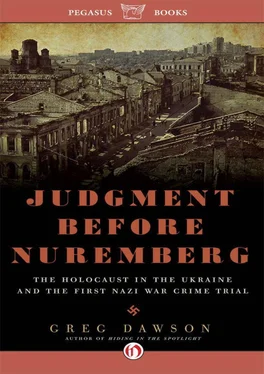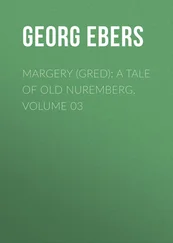In November 2010, as I prepared for my trip to Ukraine to do research for this book, I was startled to detect a crack in the great wall of my mother’s opposition to capital punishment. Looking back now, I should not have been so surprised. For the first time in her life, she was reading an account of the Holocaust—not including my telling of her story, Hiding in the Spotlight, which she read in manuscript at my request, making annotations. She had not read Anne Frank’s diary or Night— though she revered Elie Wiesel—much less a psychological horrorscape like Sophie’s Choice. She had not seen Schindler’s List, The Pianist, or the TV miniseries Holocaust. Nor had she ever visited a Holocaust museum, even though a fine one, the Breman, is ten minutes from her Atlanta condo. I guess she saw no reason to go out of her way to revisit a nightmare.
It was against this backdrop that a friend in Ukraine sent her a 120-page article, in Russian, about the Nazi occupation of Kharkov and the subsequent trial. There was a name on the article, but it wasn’t clear if it was a student paper, the work of a scholar, or the report of an amateur historian. Knowing no more, I asked my mother if she could read it and translate any parts she thought would be helpful in my research. Neither of us suspected it would be a transformative experience.
A few days later, November 28, I received an ecstatic e-mail from Atlanta. “The translation is moving along well, very well, and no use trying to imagine what’s in it,” my mother wrote. “It’s so much more dramatic than we can guess. But what a thriller! I am going back to it in a minute.”
By the next morning, her mood had darkened. “I am staying astounded the entire time while translating. My mind cannot cope with the German brilliance of invention—how to kill the most people in the shortest time and the cheapest price. I now have basic aversion toward the country of great music. I want to take all the leftover butchers, put them on the verge of a high & steep hill, put them on the edge of it & then start the automatic guns. Not a tear would be lost by me.”
She dispatched Dick, her dear friend and condo mate of twenty years, to Office Depot to fax me page after page of her translation in longhand. It was immediately apparent to me that the article was written by someone with deep knowledge of the subject.
“The Nazis broke into the city of Kharkov on Oct. 24, 1941. They were equipped with the most terrifying weaponry. In no time they had black swastikas over a large building and on the wall a sign stating, ‘Death for appearing on a street from 8 p.m. until 5 a.m. Death for opposing occupying power. Death for hiding partisans.’ Dangling from ropes in the wind were bodies totally frozen and stiff.”
At the end of one fax, after translating another numbing litany of Nazi brutality and sadism visited on the residents of Kharkov, my mother took a deep breath. Something new was stirring in her, a voice I had never heard, of bitterness and joyful revenge.
“The next are my words,” she wrote. “Now I am sure I understand why they invaded Russia twice and I can guarantee that they are getting ready for the next time. Himmler said the Slavs would only need to know how to sign their names, otherwise they do not need to learn anything because the Germans are the only people that deserve to be taught more than that. But let’s look at these supermen and their gaswagens. What did they win? They cannot hide any longer their lowdown motives. Hello, supermenches, how superior do you feel after losing to Russia twice ? Rotz of ruck, Fritzes!”
Is it possible for a Holocaust survivor to lose her innocence at 83? I read it in my mother’s e-mail on December 2, 2010, telling me she could not go on with the translation.
“Someone else, maybe in Kharkov, will have to translate the pages which describe Drobitsky Yar. I cannot go over that horror again because I think that I am reading about my parents & grandparents. It’s just that I lose my emotional balance and cannot control the hate I feel toward all the world that was supportive of the Germanic mentality. They hated and kept destroying Ukraine because they never expected what was going to happen there. Good heavens, a trial of the greatest race on Earth by the people of Kharkov? Yup! Your mother wants to go back and have them rebuild Russia, the whole place including Siberia, and then get ready for the last step—throwing them all alive on the bottom of Drobitsky Yar. Sorry, I am not anymore against capital punishment.”
The next e-mail I received was on the morning of December 8, the day before my departure for Ukraine. I had sent a review of the French translation of Hiding in the Spotlight and she was unable to open the file.
“I can stand anything but more stories about the Germans in Russia,” she wrote. “I now know at least something, but none of it like anything I ever suspected. I imagine by now you have read your share about Germans who were saved by great many supporters all over the globe and maybe even some Russians. I still want to write some for you because you have to be up on this story somehow. I just hope that you will not have to give speeches or be visible in Ukraine because I know that the Germans will never stop preparing for the next round of their beloved occupation, and a lot of Russian land is good in many ways. Kharkov is terrific. I mean it was. I will let you work now. I am watching my screen here for news.”
The “news”—of deliverance and justice for the people of Kharkov and Ukraine, of condign punishment at the end of a rope for their tormentors—was to be found in my mother’s own handwriting deep in one of many faxed pages of the translated article by her countryman.
“In the nightmarish hell of concentration camps, on top of burned towns, by freshly buried graves, came belief about the inevitability and righteousness of such a trial, the kind of trial that will not only disclose unimaginable butchery of the German military but also stand as a warning to anyone else.”
Asharp unmelodic jangle pierced my sleep, jolting me awake but disoriented in total darkness. The phone! I scrambled out of bed to a small desk and grabbed the offending receiver.
“Good morning, Mr. Dawson, this is Victor at the front desk. You asked to be called at 5:45 A.M.”
“Da, da—spasiba,” I said.
It was December 15, 2010. This was the day I had been dreading. It was also the reason I had come to Kharkov. Sixty-nine Decembers ago my mother, her sister, and her parents and paternal grandparents awoke on this day to an unimaginable fate. The day before, December 14, 1941, the occupying Nazis had posted notices across Kharkov ordering all Jews to report the next day to public squares for transport to an abandoned tractor factory southeast of the city. The blind hope of Dmitri Arshansky and others was that they were being sent to a camp to serve as slave laborers until the war ended, victoriously, and they could return home. My mother had darker premonitions.
We knew it could mean only two things: they would make us laborers in a concentration camp, or it meant the end of our lives .
At noon under a powder-blue sky that belied intense cold, 16,000 Jews began the eight-mile trek to the factory. The streets were coated with fresh snow. Whip-wielding German soldiers and Schutzmannschaften —Ukrainian collaborators—patrolled the sea of marchers, some pulling carts or sleds with belongings, as it flowed glacially on Moscow Avenue out of the city. When darkness fell, the procession was still well short of the factory. By morning, the roadside and surrounding fields were littered with the bodies of marchers dead from exposure. The Arshanskys had survived by huddling together for warmth in a tiny shed Dmitri found.
Читать дальше












